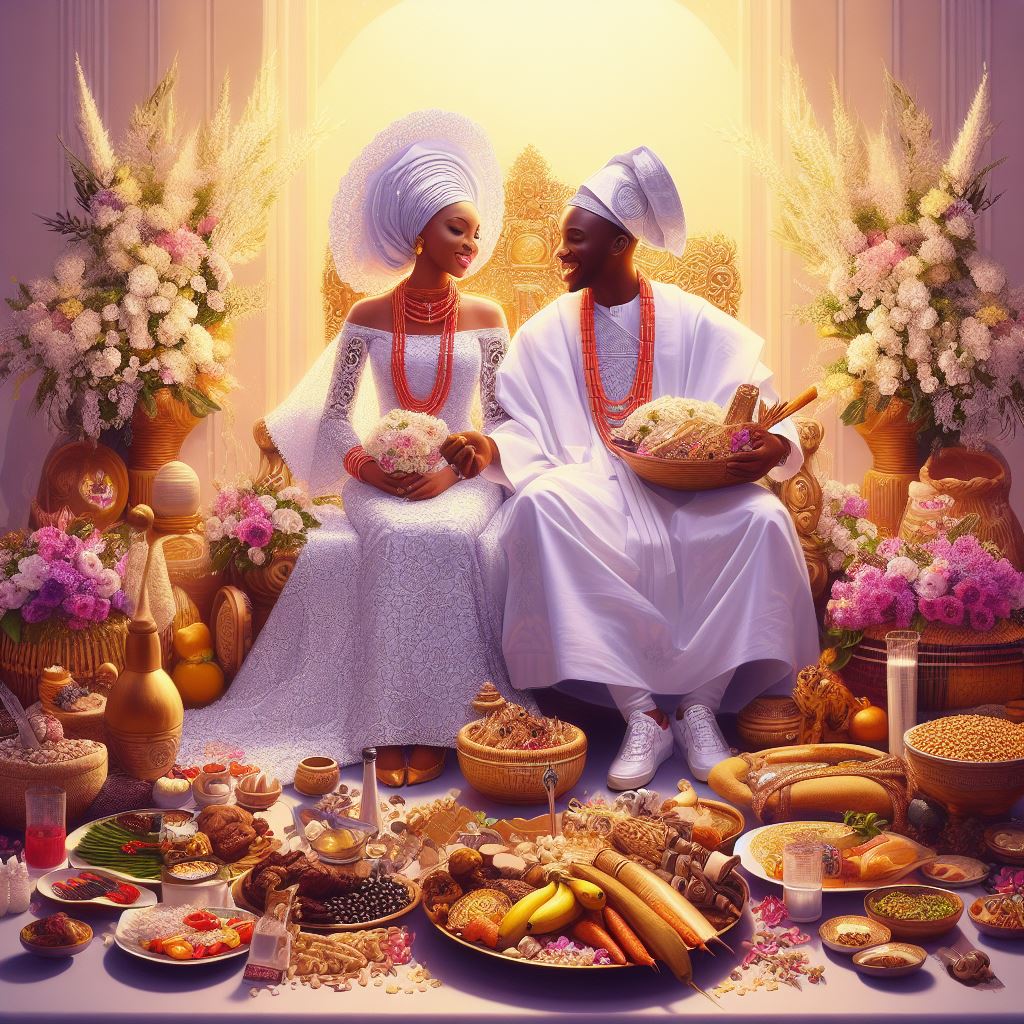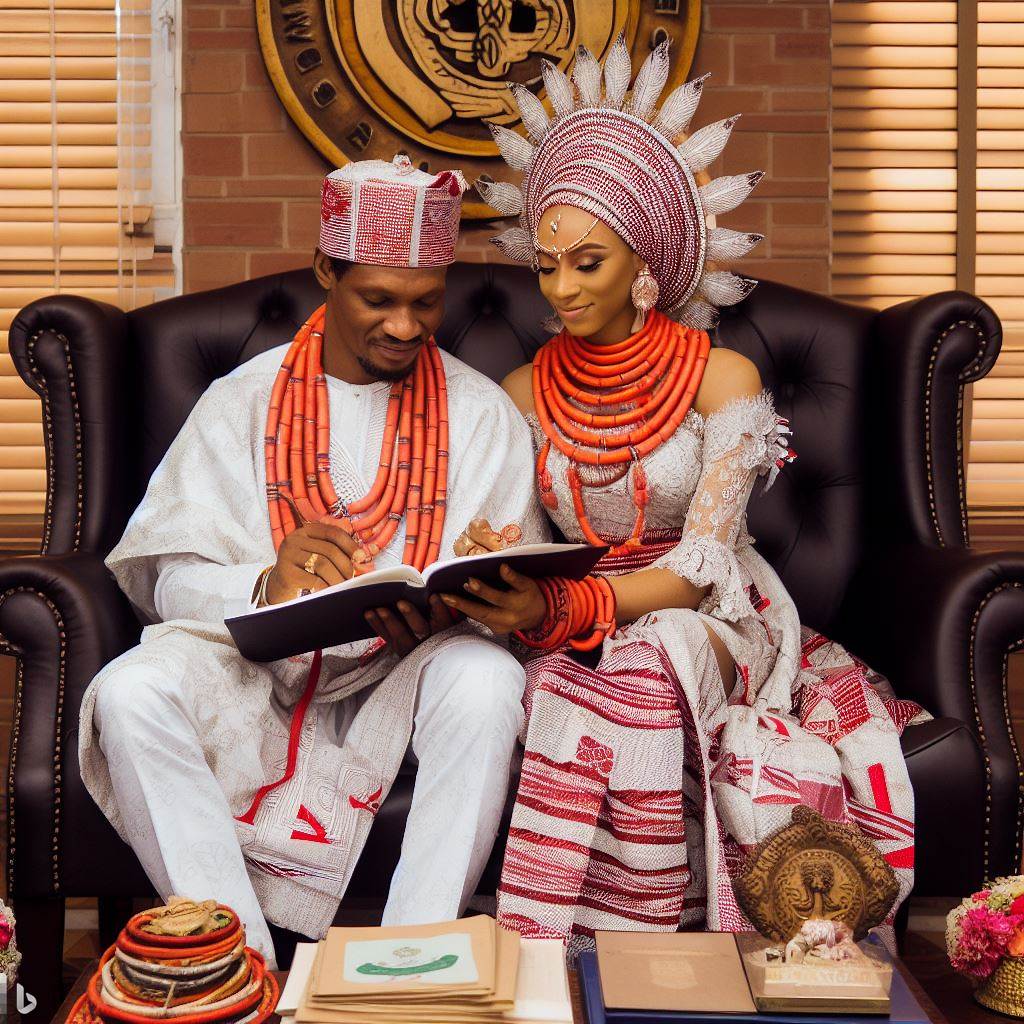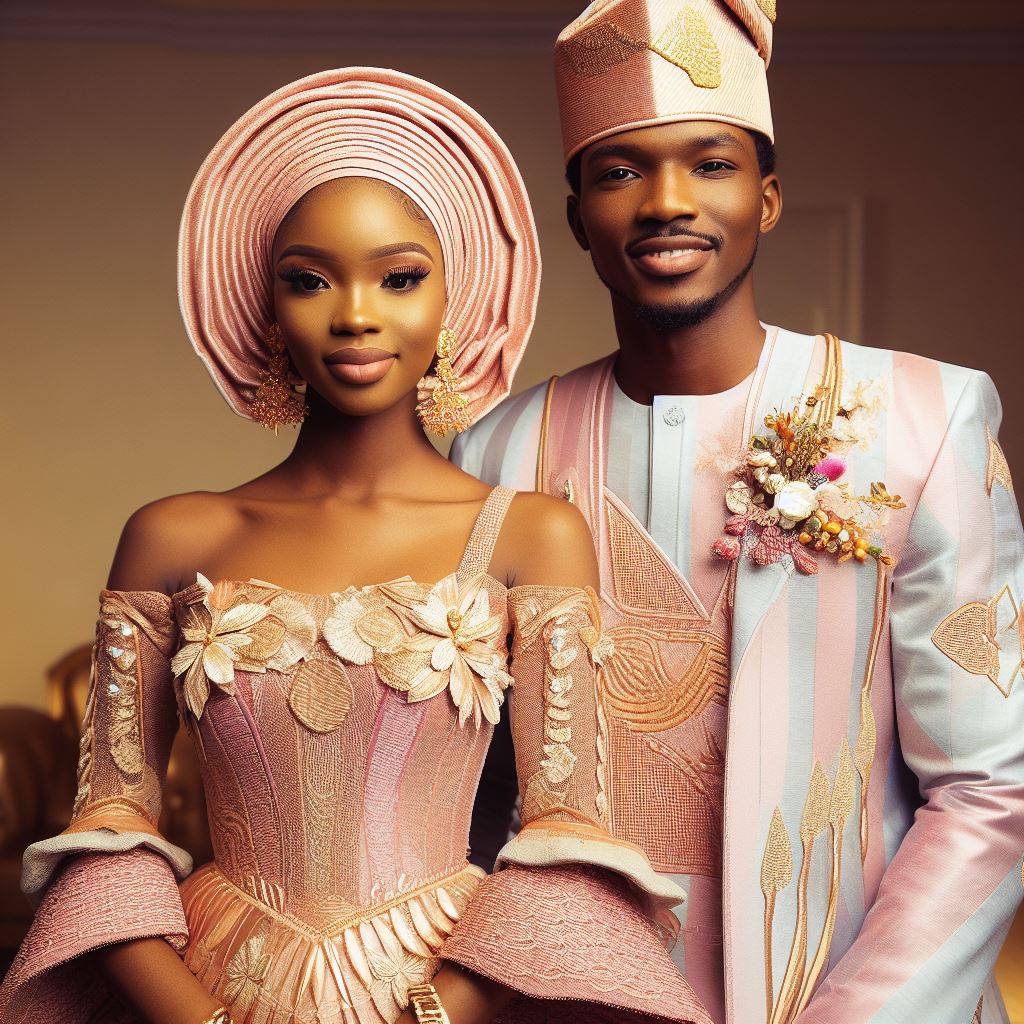Introduction
In Nigeria, marriage is a cherished institution, with rich cultural and traditional ties.
However, it’s essential to recognize the significance of the Marriage Registry over traditional weddings.
- Legal Recognition: Marriage registry provides legal recognition and protection for couples, ensuring their rights and responsibilities.
- Simplicity and Efficiency: Registry weddings are straightforward, with minimal formalities and paperwork, saving time and stress.
- Inclusivity: Registry weddings allow interfaith and inter-tribal marriages, promoting unity and diversity.
- Documentation: A marriage certificate serves as vital proof for various legal and administrative processes.
- Widening Acceptance: Registry weddings are gaining societal acceptance, making it an accessible and practical choice.
While traditional weddings celebrate culture and heritage, the Marriage Registry offers legal security, efficiency, and inclusivity that couples shouldn’t overlook.
Traditional Weddings in Nigeria
Traditional weddings in Nigeria hold significant cultural and societal importance.
These weddings are steeped in centuries-old customs, rituals, and practices that bring families and communities together.
They play a crucial role in preserving Nigeria’s rich cultural heritage.
Significance and Cultural Aspects
- Traditional weddings are seen as a union not just between two individuals but between two families.
- It is a celebration of heritage, culture, and ancestral traditions that have been passed down through generations.
- These weddings are vibrant, colorful, and elaborate affairs, showcasing the diversity of Nigeria’s numerous ethnic groups.
- They serve as a platform to display traditional attire, music, dances, and cuisine, representing the uniqueness of each tribe.
- Traditional weddings act as a source of identity, reinforcing a sense of belonging and pride in one’s cultural roots.
Rituals, Customs, and Traditional Practices
- The first step in a traditional Nigerian wedding is the introduction ceremony, where both families meet formally.
- The groom’s family presents gifts, such as kola nuts, palm wine, and wine, to the bride’s family.
- The bride’s family conducts background checks to ensure compatibility and protect their daughter’s welfare.
- The engagement ceremony follows, with the exchange of rings, blessings, and the announcement of the wedding date.
- The traditional marriage ceremony includes the solemnization of the union, witnessed by family and community members.
- Rituals like the pouring of libation, prayers, and the tying of the knot symbolize unity, fertility, and eternal love.
- Traditional dances, music performances, and storytelling portray the history and values of different ethnic groups.
Importance in Preserving Cultural Heritage
- Traditional weddings are a way of passing cultural knowledge and values from one generation to another.
- They provide an opportunity to teach younger individuals about their ancestry, customs, and societal expectations.
- By preserving and promoting traditional weddings, communities can retain their unique identities amidst globalization.
- These weddings also serve as a platform for artisans, like fabric weavers and bead makers, to showcase their craftsmanship.
- Traditional wedding ceremonies contribute to the local economy as they involve purchasing traditional garments, accessories, and food.
- they foster social cohesion by bringing people together, strengthening bonds, and promoting communal harmony.
- Preserving cultural heritage through traditional weddings contributes to the overall development and pride of the nation.
In fact, traditional weddings in Nigeria hold immense significance as they celebrate cultural heritage, foster unity, and transmit values from one generation to another.
These ceremonies are not merely about individuals but reflect the collective identity of communities.
By upholding and cherishing traditional customs, Nigeria ensures the survival and enrichment of its diverse cultural tapestry.
Read: Ensuring a Smooth Process: Tips for Marriage Citizenship
Marriage Registry in Nigeria
- Marriage registry in Nigeria formalizes unions and ensures legal recognition.
- Legal requirements include age, consent, and proof of previous marriage dissolution.
- Couples submit applications with personal details to initiate the process.
- A marriage ceremony is conducted at the registry by a marriage registrar.
- During the ceremony, the couple exchanges vows and signs the marriage register.
- After the ceremony, couples receive a marriage certificate with essential details.
- The certificate offers legal protection, inheritance rights, access to healthcare, and social security benefits.
- It serves as proof of marriage for legal matters like property ownership and child custody.
- Couples can register their marriage with various government agencies and institutions.
- This ensures full access to the rights and privileges of a legally recognized union.
Read: Children & Marriage-Based Citizenship: What You Should Know
Advantages of the Marriage Registry
Legal and Financial Benefits
Having a marriage recognized by the government through the marriage registry offers several legal and financial advantages.
- Couples can enjoy tax benefits and file joint tax returns, potentially reducing their overall tax liability.
- They may also have access to various social security benefits, including survivor benefits and pension plans.
- Marriage certificates obtained from the registry can be essential in obtaining health insurance coverage through a spouse’s employer.
- Legal recognition allows couples to make important medical and financial decisions on behalf of their partners.
- They gain the ability to include their spouse in their will, ensuring inheritance rights and financial security.
Importance of Legal Protection and Rights
Registering a marriage ensures both partners receive legal protection and enjoy their fundamental rights.
- Legal recognition provides protection against domestic violence by allowing legal actions and restraining orders.
- Partners can avail themselves of spousal privilege, which protects them from testifying against each other in court.
- In case of separation or divorce, legal procedures are available for the fair division of assets and liabilities.
- The registered partners have custody rights and visitation rights in the event of a dissolution of the marriage.
- Both partners receive equal treatment under the law, ensuring non-discrimination and fair treatment in various situations.
Use of Marriage Certificate for Official Purposes
A marriage certificate obtained from the marriage registry can serve various official purposes beyond symbolic representation.
- For immigration purposes, a marriage certificate is often required as proof of the relationship’s authenticity.
- It facilitates a smoother process for obtaining visas and residence permits for spouses of foreign nationals.
- When buying property, a marriage certificate is essential for joint ownership and obtaining mortgage loans.
- In case of the unfortunate event of a partner’s death, a marriage certificate simplifies inheritance and property transfer.
- A marriage certificate from the registry can be used to update identification documents, such as driver’s licenses and passports.
In short, the marriage registry offers significant advantages over traditional weddings, providing couples with legal and financial benefits.
It ensures legal protection and rights for both partners, allowing them to make important decisions and guarantees fair treatment under the law.
Moreover, the marriage certificate obtained from the registry holds great value for official purposes like immigration and property rights.
By utilizing the advantages of the marriage registry, couples can lay a strong foundation for a secure and recognized union.
Read: Digital Trends: Marriage Certificate Registration Online?

Delve into the Subject: Marriage in Proverbs: Wise Sayings for Nigerian Couples
Comparing Traditional Weddings and the Marriage Registry
When it comes to the significance of marriage registry over traditional weddings, it is essential to carefully consider the pros and cons of each approach.
Traditional Weddings
Traditional weddings have long been the preferred choice for couples to celebrate their union.
These ceremonies are often steeped in cultural and religious traditions, offering a sense of continuity and community.
Pros
- Symbolic and Emotional: Traditional weddings provide a platform to express love, commitment, and joy.
- Cultural Significance: They honor cultural practices, customs, and familial traditions.
- Community Involvement: Traditional weddings bring families and friends together to celebrate the couple.
- Memorable Experiences: They create lifelong memories and offer opportunities for creativity and personalization.
Cons
- Financial Burden: Traditional weddings can be expensive due to elaborate ceremonies, venue costs, and guest accommodations.
- Logistical Challenges: Organizing a traditional wedding requires significant planning and coordination.
- Time Consuming: The preparation and execution of a traditional wedding often involve months of detailed arrangements.
- Stressful Expectations: Meeting societal and familial expectations can bring unnecessary pressure to the couple.
The Marriage Registry
The marriage registry, on the other hand, provides an alternative approach to formalizing a union with its own unique advantages.
Pros
- Simplicity and Efficiency: The marriage registry offers a streamlined process for couples to legalize their marriage.
- Cost-effective: Registering a marriage is usually less expensive compared to organizing a traditional wedding.
- Legal Protection: The registry ensures that the marriage is recognized by the state and offers legal benefits.
- Flexibility and Accessibility: Couples can choose a convenient time and location to register their marriage.
Cons
- Lack of Elaborate Celebrations: The marriage registry may lack the grandeur and festivity of a traditional wedding.
- Missing Cultural and Religious Rituals: The simplicity of the registry may omit cultural or religious practices important to the couple.
- Reduced Family Involvement: Registering a marriage may not offer the same level of community participation as a traditional wedding.
- Potential Lack of Personalization: The registry process may be perceived as impersonal compared to a carefully planned wedding ceremony.
Streamlined and Secure Process
Despite the challenges and limitations of traditional weddings, the marriage registry serves as an efficient and secure option for couples seeking a simpler approach to legalizing their union.
Through the registry, couples can prioritize their commitment to each other without the financial burdens, time-consuming arrangements, and stress that often accompany traditional weddings.
Additionally, the marriage registry offers the benefit of legal protection, ensuring that the rights and responsibilities of marriage are recognized by the state.
Couples can enjoy the legal benefits and security that come with a registered marriage.
While the registry may lack the cultural significance, family involvement, and personalized experiences of traditional weddings, it can be an ideal choice for couples who value efficiency, simplicity, and accessibility.
Ultimately, whether couples opt for a traditional wedding or the marriage registry depends on their personal preferences, cultural backgrounds, and desired level of involvement from their communities.
When comparing traditional weddings and the marriage registry, it becomes evident that both approaches have their pros and cons.
While traditional weddings provide an opportunity for grand celebrations and cultural significance, they can also be costly, time-consuming, and stressful.
On the other hand, the marriage registry offers a more streamlined and secure process, allowing couples to prioritize their commitment and benefit from legal protection.
Ultimately, the choice between these two approaches depends on the couple’s values, priorities, and the significance they attach to different aspects of their marriage celebration.
Read: Marriage Forms in Nigeria: A Comprehensive Guide for Couples
Gain More Insights: Marriage Registry vs. Church Wedding: What’s Legal?
Changing Attitudes Towards Marriage in Nigeria
In Nigerian society, the perceptions of marriage have undergone significant changes in recent years.
Evolving Perceptions of Marriage
- Youthful generations are embracing new ideas, challenging traditional views on marriage.
- The emphasis on companionship and compatibility is gaining prominence in relationships.
- Marriage is increasingly seen as a partnership based on mutual respect and shared goals.
- Gender roles are being redefined, with more women pursuing education and careers.
- Arranged marriages are becoming less common, as individuals seek love and personal fulfillment.
- Divorce and remarriage are more accepted, as societal attitudes towards second chances evolve.
Importance of Legal Recognition
- Youthful couples today attach great significance to the legal recognition of their unions.
- Legal marriage offers protection and rights, ensuring financial and emotional security for both partners.
- It provides a framework for property ownership, inheritance, and custody of children.
- Legal recognition also legitimizes the couple’s commitment in the eyes of society and their families.
- Young couples understand the benefits of legal marriage and actively pursue it.
Impact of Globalization on Wedding Traditions
- Globalization has had a profound influence on Nigerian wedding traditions.
- The exposure to Western culture through media has introduced new ideals and expectations.
- Expensive and elaborate weddings have become more common as status symbols.
- There is a growing pressure to conform to Western-style weddings with lavish ceremonies.
- Wedding planners and vendors capitalize on these expectations, creating a lucrative industry.
- However, some couples embrace a fusion of traditional and modern elements in their weddings.
In general, the attitudes towards marriage in Nigeria have experienced significant transformations influenced by various factors.
The evolving perceptions of marriage emphasize companionship, partnership, and personal fulfillment.
Youthful couples increasingly prioritize legal recognition, acknowledging the benefits and protection it offers.
The impact of globalization has led to a shift towards more extravagant weddings, influenced by Western ideals.
However, there is also a growing trend of blending traditional and modern elements in wedding ceremonies.
these changes reflect the dynamic nature of Nigerian society and the evolving significance of marriage.
Conclusion
The marriage registry holds immense importance in Nigeria.
It provides legal recognition to couples, ensuring their rights and protection.
The significance of formalizing marriages through the registry cannot be overlooked.
By registering their marriages, couples can avail themselves of various benefits and privileges.
They gain legal rights, such as inheritance, property ownership, and social security benefits.
Additionally, registering ensures that their union is protected by law.
It is crucial for readers to consider the advantages of formalizing their marriages through the registry.
By doing so, they can guarantee their rights and protect themselves and their families.
The registry provides a solid foundation for a lasting and secure relationship.
By acknowledging the importance of the marriage registry, individuals can actively contribute to the development and progress of society.
It promotes stability and encourages accountability in relationships.
In a nutshell, couples should prioritize the marriage registry as a means of legal recognition and protection.
It offers countless advantages and ensures the rights and well-being of married individuals.
Embracing the registry is a step towards a fulfilling and secure married life.




